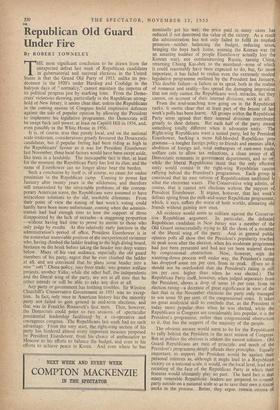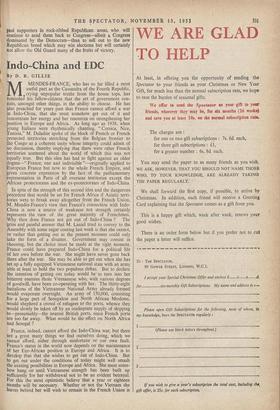Republican Old Guard Under Fire
By ROBERT TOWNELEY THE most significant conclusion to be drawn from the unexpected defeat last week of Republican candidates in gubernatorial and mayoral elections in the United States is that the Grand Old Party of 1953, unlike its pre- decessor in the 1920's under Harding and Coolidge in the halcyon days of "normalcy," cannot maintain the impetus of its political progress just by marking time. From the Demo- crats' victorious showing, particularly in the Republican strong- hold of New Jersey, it seems clear that, unless the Republicans in the coming session of Congress build impressive defences against the tide of popular opinion by allowing the'President to implement his legislative programme, the Democrats will be swept back MO power, at least on Capitol Hill in 1954, and, even possibly in the White House in 1956.
It is, of course, true that purely local, and on the national scale irrelevant, considerations greatly favoured the Democratic candidates, but if popular feeling had been riding as high in the Republicans' favour as it was for President Eisenhower last November, these local factors would have been swept aside, like trees in a landslide. The inescapable fact is that, at least for the moment, the Republican Party has lost its élan, and the name of Eisenhower can no longer alone bear the burden.
Such a conclusion by itself is, of course, no cause for undue pessimism in the Republican camp. Coming to power last January after twenty years in the wilderness, and therefore still untarnished by the intractable problems of the contem- porary American scene, the Republicans were assumed to have miraculous solutions to the old, insoluble dilemmas. From their point of view the timing of last week's voting could hardly have been more unfortunate, coming when the adminis- tration had had ,enough time to lose the support of those disappointed by the lack of miracles—a staggering proportion —without having had time to prove its merits to those who only judge by results. At this relatively early juncture in the administration's period of office, President Eisenhower is in the somewhat unenviable position of the inexperienced swimmer who, having climbed the ladder leading to the high diving board, hesitates on the brink before taking the header into deep waters below. Many of his vast audience, especially the old guard members of his party, regret that he ever climbed the ladder at all, and are convinced that he plans some header into a new " soft" China policy, into freer trade, into greater welfare projects, another Yalta; while the other half, the independents and the liberal wing of the party, are not at all sure that he either intends or will be able to take any dive at all.
Any party or government has teething troubles. Sir Winston Churchill's Conservative Government in 1951 was no excep- tion. In fact, only once in American history has the minority party not failed to gain ground in mid-term elections, and that was in Franklin Roosevelt's first term. Then, however, the Democrats could point to two sessions of spectacular presidential leadership facilitated by a co-operative and courageous congress. The Republicans last week had no such advantage. From the very start, the right-wing section of his party has hindered almost every important measure proposed by President Eisenhower, from his choice of ambassador to Moscow to his efforts to balance the budget, and even in his efforts to achieve peace in Korea. And even where he has nominally got his way, the price paid in many cases has reduced if not destroyed the value of the victory. As a result the administration has not only failed to fulfil its implied promises—neither balancing the budget, reducing taxes, bringing the boys back home, winning the Korean war (to an amazing number of people Eisenhower actually lost the Korean war), nor outmanceuvring Russia, taming China, returning Chiang Kai-shek to the mainland—none of which it could reasonably have been expected to do, but, far mo important, it has failed to realise even the extremely moders legislative programme outlined by the President last Januaryi This double failure—a failure so to speak both in the realmd of romance and reality—has spread the damaging impressiorl that not only cannot the Republicans work miracles, but they, cannot, on account of their internal divisions, work at all.
From the soul-searching now going on in the Repul)lica ranks, it seenis clear that at least part of the lesson of las week's polls has been learnt. All groups within the' Republica Party seem agreed that their internal divisions contributed greatly to their defeats. But each half of the party meanA something totally different when it advocates unity. Thi Right-wing Republicans want a united party, led by Presideni Eisenhower, backing a more full-blooded Republican proj gramme—a tougher foreign policy to friends and enemies alike, abolition of foreign aid, total embargoes of east-west trade welfare cuts to allow tax reductions, a clean sweep of all Democratic remnants in government departments, and so on, while the liberal Republicans insist that the only effectiv4 unity would consist in the right-wing Republican caucW rallying behind the President's programmes. Each group it convinced that its own version of Republicanism undiluted lt what the electorate wants. • The Conservative wing admits, M course, that it cannot win elections without the support 01 President Eisenhower. It argues, however, that last week's defeats spring from the milk-and-water Republican programme, which, it, says, suffers the worst of both worlds,, alienating old friends without gaining new ones.
All evidence would seem to militate against the Conserva. tive Republican argument. In particular, the defeated • Republican candidate in New Jersey was a member of the Old Guard unsuccessfully trying to fill the shoes of a membei of the liberal wing of the party. And in general publig opinion polls all show that the President's popularity reachecl its peak soon after the election, when his moderate programme had just been presented and had not yet been watered down by congressional obstruction. Now, however, wi,th the watering-down process well under way, the President's rating has dropped some ten per cent. from its peak. (Even so it should not be overlooked that the President's rating is still ten per cent. higher than when he • was elected.) The Republican Party itself, however, when judged separately from the President, shows a drop of some 16 per cent, from its election rating---a decrease of great significance in view of the fact that in the November elections the party only managed to win some 50 per cent. of the congressional votes. It takes no great analytical skill to conclude that, as the President it today more p.opular than when he was elected, while the Republicans in Congress are considerably, less popular, it is the President's programme, rather than congressional obstruction to it, that has the support of the majority of the people.
The obvious answer would seem to be for the Republicans to rally behind the President in the next session of Congress. But in politics the obvious is seldom the easiest solution., Old Guard Republicans are men of principle, and much of the President's programme deeply offends their principles. Equally important, to support the President would be against their personal interests as, although it might lead to a Republican victory on a -national scale, it would, on the local level, lead to a recasting of the face of the Republican Party in which their features would ultimately play no part. The hard fact is that many venerable Republican leaders•are prepared to conunil party suicide on a national scale so as to save their own political necks in the process. Better, they argue, remain certain of Past supporters in rock-ribbed Republican areas, who will continue to send them back to Congress—albeit a Congress dominated by the Democrats—than to sell out to the new Republican breed which may win elections but will certainly not allow the Old Guard many of the fruits of victory.

































 Previous page
Previous page